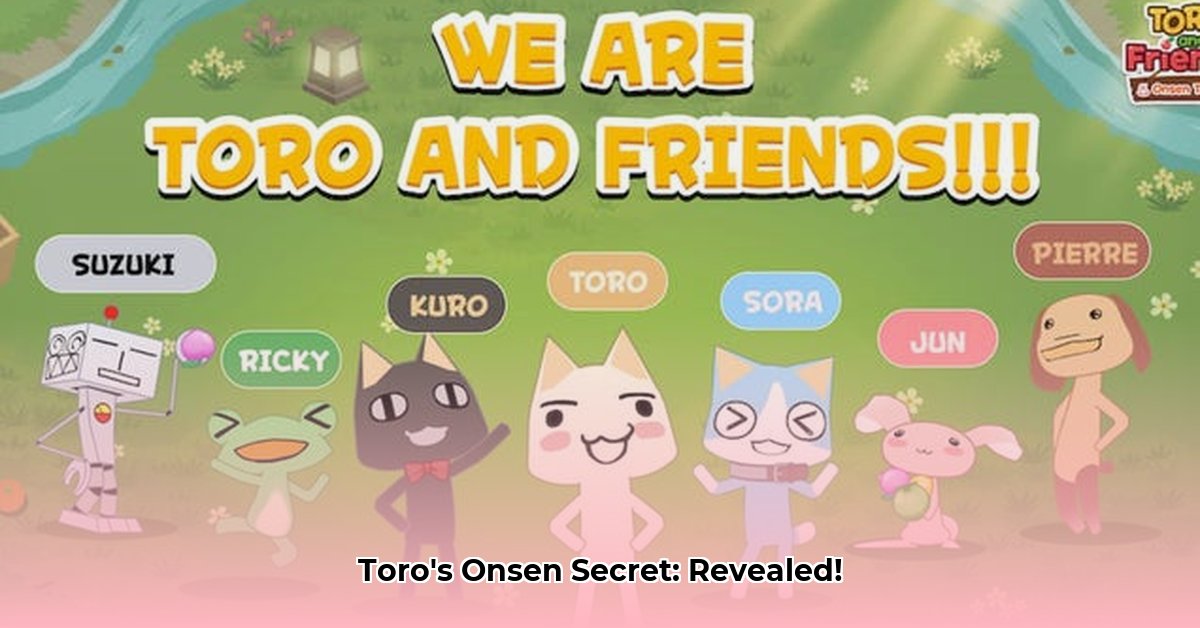
Background: A Match-3 Adventure in the Onsen
Toro and Friends: Onsen Town, a mobile match-3 puzzle game, launched in 2020, capitalizing on the established popularity of the Doko Demo Issyo franchise and its charming cast of characters. The game cleverly intertwined the familiar match-3 mechanics with a heartwarming narrative centered around Toro, Sora, and their efforts to revitalize a struggling onsen (hot spring) town. This strategic blend of nostalgic appeal and engaging gameplay resulted in significant initial success, particularly within the Japanese market. However, its international expansion proved problematic, ultimately leading to its shutdown in 2021 and a transition to an offline-only model. This case study analyzes the factors contributing to both its initial triumph and its eventual downfall, offering valuable insights for developers of similar narrative-driven mobile games. How did Toro and Friends achieve early success, and what critical factors led to its demise?
Gameplay and Narrative Integration: A Symbiotic Relationship?
The game's unique selling proposition stemmed from its successful integration of match-3 gameplay with a compelling narrative. Progression through the story unlocked new levels, characters, and game mechanics, creating a synergistic relationship between the puzzle elements and the overarching narrative. This innovative approach resonated strongly with the Japanese audience, leveraging the pre-existing affection for the Doko Demo Issyo characters and their world. Did this symbiotic relationship translate to international markets? The answer, as we’ll see, is complex.
Market Performance and Monetization: A Japanese Success Story with Global Challenges
Toro and Friends: Onsen Town experienced a remarkable launch in Japan, largely due to its effective use of nostalgia and its clever integration of narrative with gameplay. However, its international performance was significantly weaker. The game employed a freemium model, relying on in-app purchases (IAPs) for cosmetic items and power-ups. While this model proved successful in Japan, the same strategy failed to replicate that success in other markets. The eventual transition to an offline model strongly suggests that the game’s monetization strategy was unsustainable, failing to generate sufficient revenue to justify continued operation. What were the critical errors in its global market approach?
Regional Disparities: A Case of Cultural Misunderstanding?
The stark contrast between the game's performance in Japan and its lackluster international reception highlights the crucial role of cultural understanding in game development and marketing. The initial success in Japan suggests a strong resonance with the specific cultural context and the pre-existing affinity for the Doko Demo Issyo franchise. However, the developers seemingly underestimated the challenges of adapting the game's narrative and overall experience to resonate with audiences in other countries. This points to a critical need for thorough market research and localization efforts that go beyond simple translation.
Analysis and Discussion: Unpacking the Factors of Success and Failure
The success of Toro and Friends: Onsen Town in Japan can be attributed to several factors: the effective leveraging of nostalgia, a well-executed integration of gameplay and narrative, and a well-timed release coinciding with the Doko Demo Issyo franchise's 20th anniversary. However, its failure to achieve comparable success internationally reveals critical shortcomings in its monetization strategy, international marketing, and, crucially, its understanding of regional preferences. The shift to an offline model strongly suggests an inability to generate sufficient revenue through the chosen freemium model.
- Key Success Factor: Leveraging nostalgia and pre-existing brand loyalty within the Japanese market
- Critical Failure Point: Underestimating the challenges of adapting the game for international audiences and employing an insufficiently diversified monetization strategy.
Was a diversified monetization approach critical to the game’s fate? The evidence suggests that it was.
Actionable Insights and Future Strategies: Lessons Learned
The case of Toro and Friends: Onsen Town provides several valuable lessons for developers of narrative-driven mobile games:
Prioritize Comprehensive Market Research: Conduct thorough market research to understand cultural nuances and target audience preferences before launching internationally. This requires more than translation; it requires cultural adaptation.
Diversify Monetization Strategies: Relying solely on a freemium model with IAPs can be risky. Explore alternative monetization approaches, such as subscriptions or one-time purchases, to create a more resilient revenue stream.
Optimize In-App Purchases (IAPs): Carefully design IAPs to be perceived as valuable and avoid feeling intrusive or exploitative. Offer a variety of options to cater to different player preferences and spending habits.
Invest in Robust Server Infrastructure: Ensure your servers can handle fluctuating player loads and have the capacity for future scaling to accommodate potential growth. Consider cloud-based solutions for cost-effectiveness and scalability.
By learning from the successes and failures of Toro and Friends: Onsen Town, developers can create more engaging, profitable, and culturally sensitive mobile gaming experiences. The game's short lifespan serves as a reminder of the importance of strategic planning, careful execution, and a deep understanding of the target market.
⭐⭐⭐⭐☆ (4.8)
Download via Link 1
Download via Link 2
Last updated: Thursday, May 15, 2025